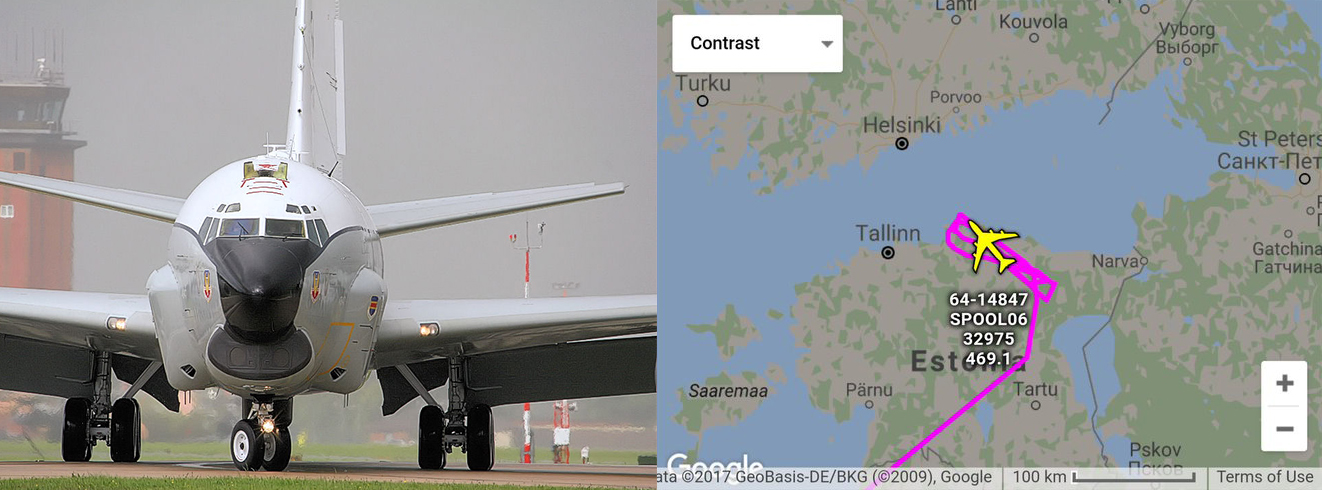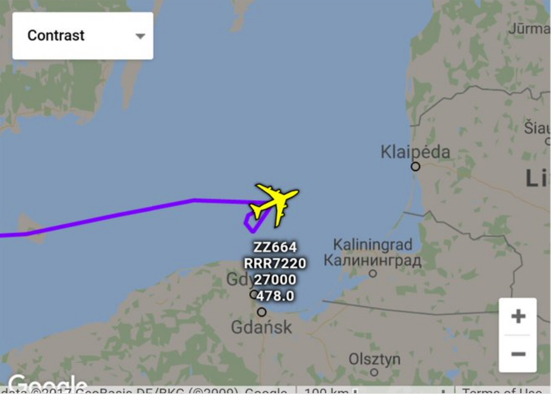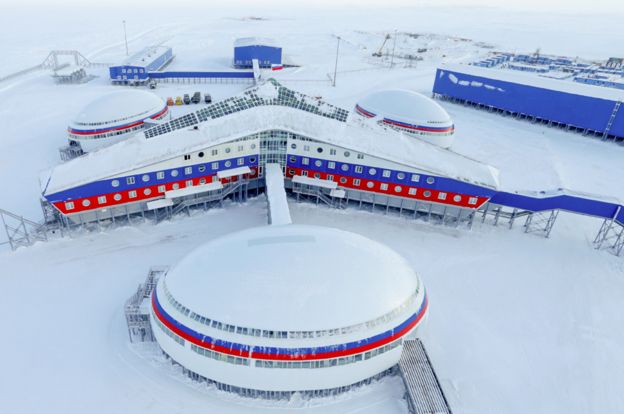It was just a few days ago that the United States deployed advanced fighter jets to Estonia as a rather ‘in-your-face’ tactic to Russia. Why not, Russia has a history of doing the same to the United States including the spy ship on our Atlantic coast line, buzzed our destroyers and the constant flying of bombers near U.S. airspace of Alaska. So…what is the full story of our F-35’s in Estonia?
On Apr. 25, two U.S. Air Force F-35As belonging to the 34th Fighter Squadron, from Hill Air Force Base, Utah, deployed to the UK since mid April, flew from RAF Lakenheath, UK, to Ämari, Estonia.
Based on the information gathered by aircraft spotters, airband listeners and ADS-B monitors, who tracked the mission to Estonia of the F-35s, the two 5th generation multirole combat aircraft , 14-5102 and 14-5094, using radio callsign “Conan 01” and accompanied by “Quid 89”, a 100ARW KC-135 from RAF Mildenhall, departed from RAF Lakenheath at 07.35z.
The trio landed in Estonia shortly before 11.00z and took part in a brief ceremony (at this link you can find some interesting photographs).
Noteworthy, the quick visit to Estonia was “accompanied” by a rather unusual activity of U.S. and British spyplanes in the Baltic region.
In fact, as the F-35s headed towards Amari in formation with their KC-135 tanker, as many as three RC-135s (including a RAF bird) operated in the airspaces over or close to Estonia.
The U.S. Air Force dispatched an RC-135W Rivet Joint 62-4139 “Haiti 79” and an RC-135U Combat Sent 64-14847 “Spool 06” to the Baltic states. The Rivet Joint positioned off Kaliningrad Oblast, where some of the most active Russian bases in the Baltic region are located, whereas the Combat Sent started a racetrack over Estonia, not far from the border of mainland Russia.
Shortly thereafter, even a RAF RC-135W “Airseeker,”one of the three ex-USAF KC-135 tanker converted to the Rivet Joint variant starting back in 2011, from RAF Waddington joined the scene. The British intelligence gathering plane that, just like the American “RJs” is equipped with all sorts of antennae and sensors, to eavesdrop enemy signals, transmissions, detect frequencies used by radio and radars and pinpoint sites of interest, mobile stations, SAM batteries, etc., maintained a racetrack off Kaliningrad
At 14.43Z, the two JSFs departed Ämari to return to the UK and shortly thereafter both the U.S. and RAF spyplanes headed back to their homebases.
Although we can’t but speculate here, it appears to be quite likely that the RC-135 missions to the Baltic were somehow related to the deployment of the F-35 so close to the Russian border. In fact, whilst Rivet Joint and Combat Sent aircraft regularly fly to the region and can be daily tracked online as they head towards the international airspace off Lithuania, Estonia and Latvia, the presence of three such spyplanes not too far away from one another seems to suggest their missions were coordinated and probably related to something “big” happening there.
And the only “big thing” (Zapad 2017 preparation aside) we are currently aware of is the first presence of the JSF in Estonia. Moreover, not only was the type of racetrack flown by the Combat Sent unusual, but it was also located in a pretty interesting position: east of Ämari, as if the RC-135U, an aircraft designed to collect technical intelligence on adversary radar emitter systems, was there to detect emissions from Russian radars interested in the F-35.
However, there is another possibility: what if the American and British spyplanes were there to deter the Russian from using their radars?
Indeed, whilst three RC-135s flying at the same time in the same area is something unusual, it is quite weird that the three spyplanes had their ADS-B transponder turned on during their missions.
“If they wanted to hide, they would do” says the ADS-B / ModeS tracking enthusiast who runs the popular @CivMilAir and @ADSBTweetBot Twitter feeds. “The daily RC-135s flights over the Middle East very rarely show up and even the daily missions to the Baltics can usually be tracked during their transit to the area of operations, where often the transponder is turned off. That’s why I believe they remained trackable on purpose.”
Spyplanes, including the U-Boat (as the RC-135U Combat Sent is nicknamed in the pilot community), usually operate in “due regard” with transponder switched off, with no radio comms with the ATC control, using the concept of “see and avoid” where the pilot flying is responsible for avoiding all traffic conflicts. Even if RC-135s can be regularly tracked online, they tend to keep a low-profile when reaching the area of operations, turning off the ADS-B to avoid being detected at least by commercial ADS-B receivers like those feeding online flight tracking systems such as Flightradar24.com, PlaneFinder.net or Global ADS Exchange.
On Apr. 25, both RC-135s could tracked throughout their missions suggesting they did purposely broadcast their position for everyone to see, to let everyone know they were there.
Russian spyplanes have done pretty much the same in the past: the Tu-214R, Russia’s most advanced intelligence gathering aircraft deployed to Syria and flew along the border with Ukraine with its transponder turned on. In that case it was a sort of “show of force”; yesterday was likely a way to prevent some interesting details about the F-35 to be gathered by the Russians.
By the way, it’s not the first time U.S. stealth jets flying to the Baltics are directly or undirectly “accompanied” by Rivet Joints: on Apr. 27, 2016, two F-22s deployed to Siauliai Air Base Lithuania. Supported (so to say) by an RC-135W.
***
This site has often posted about the Gerasimov Doctrine. There is more with regards to ‘active measures’ which in modern day terms is chaos. With regard to Ukraine it looks like this:
Before the Ukrainian crisis, the Russian Federation Chief of General Staff, General Valery Gerasimov, published an article explaining the General Staff’s view of modern military operations.[2] One key point of General Gerasimov’s views, later termed the Gerasimov Doctrine, is that non-military means to affect a target country or region such as “economic sanctions, disruption of diplomatic ties, and political and diplomatic pressure” are not means to reduce chaos or avoid war, but rather means to increase stress and support traditional military operations.[3]
The idea is that existing stressors in a target region combined with stressors introduced through military and non-military means shape the environment for follow-on decisive military operations. The doctrine features six stages.
- Covert Origins
- Escalations
- Start of Conflict Activities
- Crisis
- Resolution
- Restoration of Peace (Postconflict Settlement)
Descriptions of the early stages point to the existence or creation of chaos: “Emergence of differences of interest” are linked with “formation of political opposition,” which lead to “intensifying contradictions.”[4] These methods were clearly in action in Ukraine and to a lesser extent Georgia.[5] They also may already be at work in Belarus, as this article in Belarus Digest suggests.
Then we have the U.S. election intrusion:
General Director of Russia’s Political Information Center: The U.S. Influenced Russia’s 2016 Duma Elections
The General Director of Russia’s Political Information Center, Aleksei Mukhin, said there is evidence that the U.S. influenced Russia’s 2016 Duma elections. Mukhin said: “As my colleagues have pointed out quite fairly, the problem is far bigger than attempts at meddling in the 2016 election process. My center has identified direct traces of such interference and very serious and deep ones.
“As soon as Russia took the trouble of looking into the activity of some non-governmental organizations in its territory and adopted laws restricting that activity [it happened during preparations for the 2016 State Duma elections] it became clear that the United States had taken measures to create special units, including those within its armed forces, secret services, government agencies and also non-governmental organizations, for direct information confrontation with Russia. [In particular] the number of centers producing anti-Russian content, addressed mostly to the Russian-speaking audience, was increased [Mukhin refers to Voice of America, Radio Liberty radio stations, and the commercial U.S. television network CNN]. At the legislative level [in the United States] strategies of causing resistance to Russian information policies have been enhanced at the legal level. Their implementation is a sure way towards intervention in Russia’s internal affairs.”
***
‘Izvestia’: Russia Will Never Join The Western Coalition Led By The U.S.
According to Pro-Kremlin daily Izvestia, Russia will never join the Western Coalition led by the U.S. in Syria. Quoting two unidentified diplomatic sources, Izvestia wrote: “Moscow will never join a coalition under American auspices. We have explained that to our partners behind closed doors. We argue that their actions in Syria are illegitimate. They indeed proposed that we join them, but under the main condition that the U.S. leads the cause of the fight against terror. We are likewise unwilling to do so… If some coalition receives UN Security Council [approval] for action in Syria, we’ll consider it, but it will be a completely different formation [as opposed to the current coalition].”
***
One more item:
This site has previously posted about the Russian annexing of the Arctic region with no rebuke from the Obama administration. Wanna see what the Russians are gloating about now?
UPI: The Russian Ministry of Defense has released a virtual tour showcasing a newly constructed military base located in a remote area in the Arctic.
The tour, presented on the defense ministry’s website, allows visitors to browse through various structures of the base. It does not depict or discuss any military hardware.
The release marks a notable departure from Kremlin tradition regarding military matters, which are typically highly classified. BBC News reports the facility is built to house 150 personnel for 18-month long deployments and that it is designed to withstand extremely cold temperatures.
The Kremlin considers the Arctic to be a strategic location for Russia’s air defenses.
Getty Images Image caption The large complex is permanent and has plenty of energy and storage capacity
The Arctic Trefoil permanent base is in Franz Josef Land, a huge ice-covered, desolate archipelago. The Russian military sees the resource-rich Arctic as a key strategic region. President Vladimir Putin visited the new base, on Alexandra Land, last month.
It is built on stilts – to help withstand the extreme cold – and will house 150 personnel on 18-month tours of duty. Winter temperatures typically plunge to minus 40C. See the tour here.









